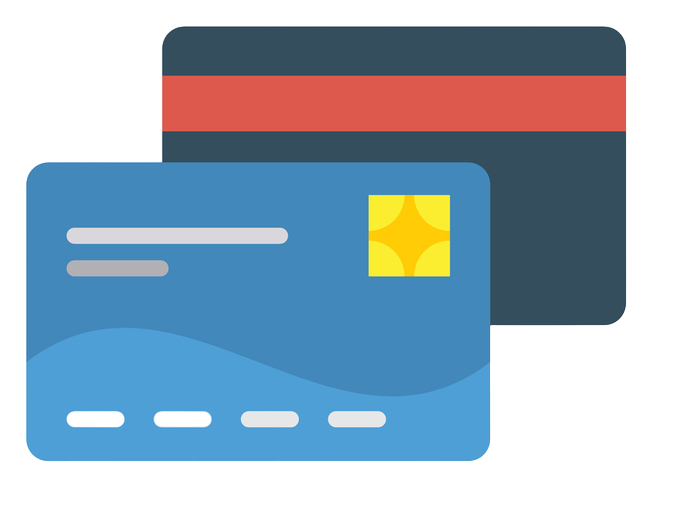Editorial Note: We may earn a commission through links from our partners. American Express is an advertiser on The Military Wallet. Commissions do not affect our editors’ opinions or evaluations. Terms Apply to American Express benefits and offers.
If you are a business owner, chances are high that you have expenses that need to be made online or expenses which require a credit or debit card. Business credit cards are easier to use for expenses such as travel, rental cars, and similar expenses because they don’t tie up funds held in your business checking account. As long as you have the cash flow to pay the bill each month, credit cards are a great way to go.
Business credit cards are also a great way to track and categorize business expenses or monitor employee spending. If you are looking for a new business credit card, then be sure to check out these offerings, all of which offer some form of a rewards program, including, cash rewards, rewards points, travel points, and more.
Featured Small Business Credit Cards
There are small business credit cards that will fill just about any need, whether your primary area of spending is office supplies, travel, gas stations, restaurants, advertising, and more.
Since businesses have specialized needs, I recommend seeking out the card that offers an excellent rewards program for your #1 expense category or applying for a business credit card that offers excellent rewards in multiple categories. If you’re lucky, you will find a card that does both!
Chase
The from Chase is the card I use for my small business. It offers excellent cash back in several categories, including spending categories that apply to most businesses. This card offers a minimum cashback rate of 1%, with no limits, and 2% cash back or 5% cash back for certain categories (annual limits apply for these rewards tiers).
Here is how the cash back program works for this card:
- 5% cash back – on the first $25,000 spent in combined purchases at office supply stores and on internet, cable and phone services each account anniversary year,
- 2% cash back – on the first $25,000 spent in combined purchases at gas stations and restaurants each account anniversary year, and
- 1% cash back – on everything else, with no limits.
In addition, there is no annual fee, and you can get employee cards at no additional cost. There is also a 0% Intro APR on Purchases for 12 months (a APR applies after the introductory period).
Unless you have very specialized spending needs, I recommend this card for many small businesses.
American Express Blue Business Cash™ Card
American Express has a long tradition of offering excellent business credit cards. The offers 2% cash back on all eligible purchases on your first $50,000 in spending each calendar year. Spending above that limit will earn you 1% cash back.
Unlike some cards, the American Express Blue Business Cash Card makes redemption easy – your cash back is automatically credited to your statement. You can also
There is a 0% APR on new purchases for up to 12 months, then a rate afterward.
There is no annual fee. (See Rates and Fees; terms apply)
Navy Federal Business Solutions
The Navy Federal Business Solutions card comes in either a Visa or a Mastercard, giving you the choice you prefer. The card offers 1% cashback on purchases with no earnings cap. There are no foreign transaction fees, which is creat for international travelers. Finally, you can add additional cardholders.
The Visa and Mastercard versions each have slightly different benefits. For example, the Visa card offers additional savings at for purchases participating merchants, offering discounts on travel services, IT Solutions, shipping services, and more. The Mastercard offers Mastercard ID Them Protection, rental car coverage, and other benefits.
You can learn more on the Navy Federal website.
The Business Platinum Card® from American Express
The is a premium card that comes with a hefty amount of benefits, but also comes with a hefty annual fee (See Rates and Fees; terms apply). So you need to run the numbers to see if this card works for your business. If it does, you can take advantage of some very nice perks.
To being with, you will
All eligible purchases earn a minimum of 1X Membership Rewards(R) points, with 5X points on flights and prepaid hotels on amextravel.com.
You can earn more rewards with large purchases. Earn 50% more points on each eligible purchases in select business categories and on purchases of $5,000 or more. There is an annual spending cap of $2 million each year.
Earn additional statement credits of up to $1,000 per year with purchases from select vendors or in select categories – with enrollment.
Additional benefits:
- Earn up to $200 in airline fee credits with select airlines
- Gain access to more than 1,400 airport lounges in over 140 countries and with The American Express Global Lounge Collection(R).
- Use your Card and get up to $189 back each year on your CLEAR(R) membership.
- Enrollment Required for Select Benefits
Unlike typical credit cards, the Card allows you to carry a balance for certain charges, but not all. This card is best for businesses that regularly spend a lot of money on cards, especially frequent travel. (See Rates and Fees; terms apply)

Compare the rates, fees, and rewards of top credit cards for military servicemembers and veterans, including cards with waived annual fees under the SCRA.
Why a Line of Credit Makes Sense for Your Business
When you’re trying to build a new business, it makes sense to have at least one open line of credit. After all, you may need to buy supplies, pay employees, or purchase special equipment at a time when funds are low. Having an open line of credit can help you get through lean times without taking drastic measures or getting a loan from a bank.
With that being said, business cards work a little differently than personal credit cards. For example, some banks, including Barclays, Citi and others, don’t report business credit card activity to their customer’s personal credit reports. Meanwhile, some banks pick and choose how to apply the CARD Act of 2009 to business accounts, leaving business customers with fewer protections.
With all that being said, the 2018 Small Business Credit Card Study from CardHub.com did point out some big similarities between how banks treat business and personal credit card accounts. One similarity is that, like with personal accounts, individuals are held liable personally for their credit card use. Another: Almost every major card data uses information from your personal credit profile to determine eligibility for a business account.
In other words, it’s nearly impossible to keep your personal and business credit profiles from intertwining. This is just another reason your credit matters; if you don’t take care of your personal credit health, your business could suffer too.
How Business Credit Cards Work
Still, business credit cards still function the same way personal credit cards do. When you use your card to make a purchase, you are offered a temporary loan against your line of credit. If you pay your balance in full before the bill is due, you’ll never need to pay interest. On the other hand, if you carry a balance, you’ll pay a certain percentage of interest on top of the balance you owe each month. The amount of interest you’ll pay is based on your APR, or Annual Percentage Rate.
Here are a few other principles you should know about small business credit cards:
Many small business cards charge an annual fee – Most of the best business cards on the market offer a slew of additional perks and rewards. Unfortunately, that generally means they charge an annual fee as well. In most cases, annual fees on business cards are between $49 and $150.
Some of the best small business cards offer generous rewards programs – Almost all small business credit cards offer perks as an incentive to use the card for everyday spending, business supplies, and equipment. These perks can include everything from travel rewards to points you can redeem for gift cards or cash back.
You don’t necessarily need a Tax ID number to apply for a small business card – Although many people assume they need a Tax ID number of Employee Identification Number to qualify for a business card, that couldn’t be farther from the truth. In many cases, you can qualify for a business card by stating your business is a sole proprietorship and using your Social Security Number on the application. You don’t need to own a large business either; any activity you do on the side to earn extra money should be seen as business income in the eyes of the IRS.
Business cards often offer larger lines of credit than personal credit cards – Because small business cards are offered to those with business expenses that may be higher than one’s personal expenses, small business cards often come with high lines of credit. Some even work as a balance transfer credit card with zero percent interest on balance transfer. And if you need to use your card for a large business purchase, having some flexibility is always a good thing.
Advantages of Applying for a Business Credit Card
A business credit card is great for a lot of corporations, small and large. Aside from the general convenience that credit cards offer, they offer many benefits.
Quick and easy application process – getting approved for a credit card can sometimes be done in minutes. An owner can have their new card in their hands in two short weeks. Time is a valuable commodity for any business.
Easy to qualify – it’s almost impossible not to find a company that will offer you a credit card. Most times it is easier to qualify for a company credit card than to qualify for a traditional business loan. This can help owners that have a less than perfect credit score.
Rewards and incentives – almost every company offers a reward or incentive program. They can range from discounts, reward points, or travel incentives. Because each credit card has different rewards, make sure you find the right one for you.
Great for businesses that require traveling – because of the reward programs, a company card can make traveling a little easier. With enough reward points, you can cash in for a free flight, early boarding, or free flight upgrade.
Keeping track of expenses – using a corporate credit card is an excellent way for smaller businesses to document all of their transactions. It can make your accounting easier at the end of the month.
Adding “users” – being able to have employees added to the credit account is a great way to manage spending. It can streamline the purchasing process if you have employees that regularly make business purchases.
Separating business from personal – A smart practice is to keep your company and personal purchases as separate as possible. Mixing your personal and business accounts can create problems that the IRS enjoys fixing.
Emergencies – one of the obvious benefits (just like a personal credit card) is for emergencies. You never know when a piece of equipment will need replacing, but it’s nice to have a card there to pay for it when it does.
Disadvantages of Applying For a Business Credit Card
Unfortunately, there is always a downside. Some business credit cards also come with a few cons.
Some Business Credit Cards Have Expensive Annual Fees – some credit cards come with pricey annual fees. For some owners, the convenience isn’t worth the price. There are some companies that offer “No annual fees”, which can help save you money through the years.
Personal liability – this is something to always be aware of when applying for a business credit card. In most cases, the person that applies for the business credit card will be held fiscally responsible for any unpaid credit card debt. This can destroy your business credit score, as well as your personal credit.
Variable-rates – unless you find one of the few fixed-rate credit cards, you will be dealing with variable Annual Percentage Rates. With company credit cards, companies are not required to give you notice of increasing APR. There are some companies that offer excellent rates when you signup and then raise the rates after.
Security Issues – unlike a personal credit card, a company credit card is often passed between employees. This opens up doors for theft, fraud, or unauthorized purchases.
Less protection – using a business credit card offers less financial protection than a personal card. Personal credit cards are protected under the 2009 Credit CARD Act. This Act helps protect cardholders against excessive fees and charges, but the Act does not cover any type of business card.
Less “grace period” – most companies offer grace periods for missing payments or for questioning charges made on a credit card. This isn’t always true for a business credit card. Companies’ often have stricter rules for your company card.
How to Select a Small Business Credit Card
Now that you know all about small business credit cards and how they work, it’s time to decide if a business line of credit is right for you. Here are some tips that can help you figure out which business card is right for you – and if you can qualify for one in the first place.
Determine whether your business activities will help you qualify – Although you don’t need a large business with employees to qualify for a small business card, you do need to participate in a money-seeking activity. You can use the IRS definition as a guide:
“The term trade or business generally includes any activity carried on for the production of income from selling goods or performing services. It is not limited to integrated aggregates of assets, activities, and goodwill that comprise businesses for purposes of certain other provisions of the Internal Revenue Code. Activities of producing or distributing goods or performing services from which gross income is derived do not lose their identity as trades or businesses merely because they are carried on within a larger framework of other activities that may, or may not, be related to the organization’s exempt purposes.”
Be aware of your personal credit score and overall credit health – Since banks that issue small business cards will look at your personal credit score when you apply, it’s important to keep your credit in tip-top shape. If it isn’t there already, you might want to take some steps to improve it first. Since business cards usually offer a lot of perks, they are fairly difficult to qualify for.
Look for a card with low fees and/or a low APR – If you plan to utilize your line of credit often or carry a balance, it is wise to look for cards with the lowest APR possible. A card with a reasonable annual fee can also help keep more money in your pocket.
Compare perks and rewards – Most of the best small business cards offer a generous rewards program with points redeemable for gift cards, travel, or cash. Still, not all rewards programs are equal. Whatever you do, take special care to compare each rewards program to see how it stacks up. In addition to rewards, the right card can also help you qualify for all kinds of perks including cash back, trip cancellation/trip delay insurance, primary rental car insurance, and more.
If you need a line of credit for your small business, a small business credit card might be exactly what you need. By offering a flexible line of credit that is there when you need it, your credit card can save you a lot of hassle and help your business survive lean times.
Just make sure to research all of the best business cards before you apply. There are plenty of options, but only you can decide which card is best for your situation.
For rates and fees for the American Express cards mentioned in this post, please see the following links: The Business Platinum Card® from American Express (See Rates and Fees; terms apply); See Rates and Fees; terms apply for the American Express Blue Business Cash™ Card.
The Military Wallet has partnered with CardRatings for our coverage of credit card products. The Military Wallet and CardRatings may receive a commission from card issuers. Some or all of the card offers that appear on The Military Wallet are from advertisers. Compensation may impact how and where card products appear, but does not affect our editors’ opinions or evaluations. The Military Wallet does not include all card companies or all available card offers.



About the comments on this site:
These responses are not provided or commissioned by the bank advertiser. Responses have not been reviewed, approved or otherwise endorsed by the bank advertiser. It is not the bank advertiser’s responsibility to ensure all posts and/or questions are answered.